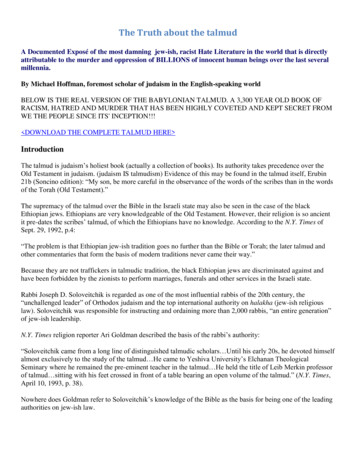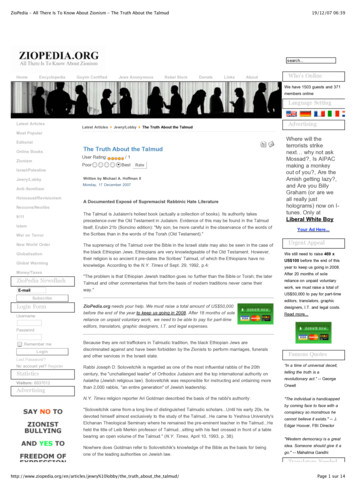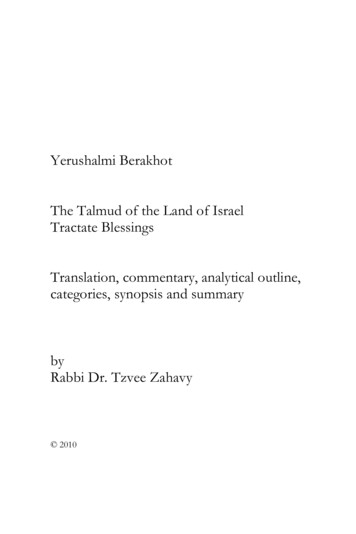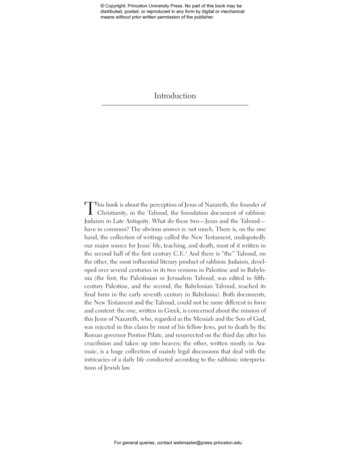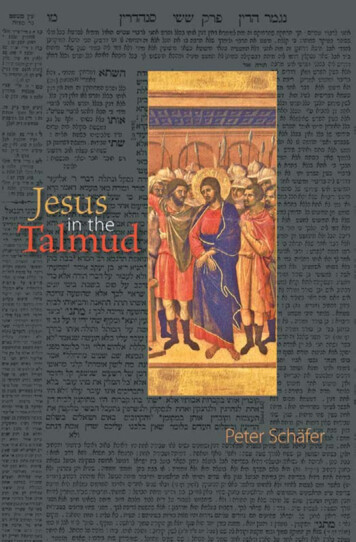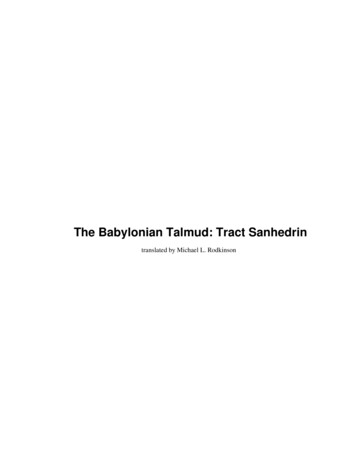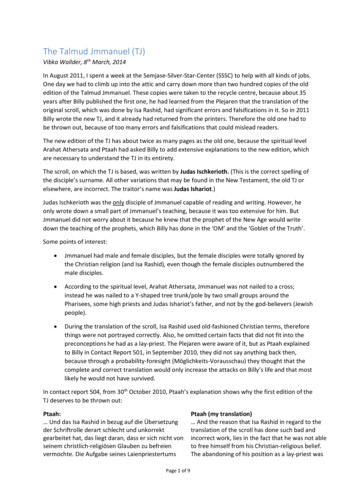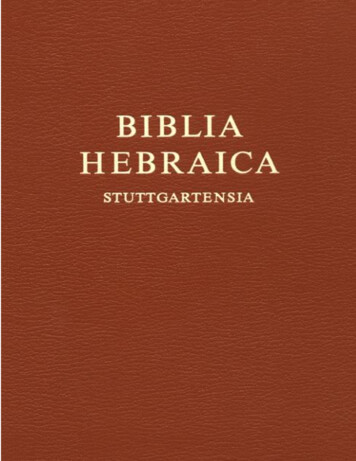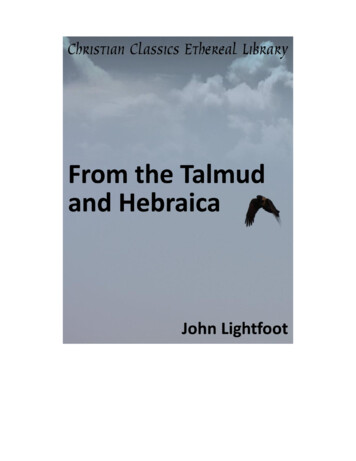
Transcription
From the Talmud and HebraicaAuthor(s):Lightfoot, John (1602-1675)Publisher:Grand Rapids, MI: Christian Classics Ethereal LibraryDescription:Subjects:The Talmud is the main text of Judaism (other than the OldTestament). It contains rabbinical teachings on the Bible andJewish law, philosophy, history, ethics, customs, and tradition.John Lightfoot began the task of relating the Talmud to thetext of the New Testament. He hoped to help modern NewTestament readers better understand the Jewish historicaland cultural background behind the text. By commenting onthe Jewish traits of first century culture, Lightfoot is able tobring new context to readers. Lightfoot passed away beforehe could finish this monumental task, but he completed largevolumes of verse-by-verse commentary on the Gospels.From the Talmud and Hebraica (Hebraica refers to theHebrew language) is a beneficial source for new perspectiveson the New Testament.Abby ZwartCCEL Staff WriterThe BibleNew TestamentWorks about the New Testamenti
ContentsMatthew1Matthew Intro2Chapter 15Chapter 218Chapter 339Chapter 464Chapter 574Chapter 699Chapters 7,8,9115Chapters 10,11128Chapters 12,13141Chapters 14,15,16158Chapters 17,18,19175Chapters 20,21,22193Chapter 23208Chapters 24,25221Chapter 26233Chapters 27,28256A Chorographical Century273Chapters 1-10273Chapters 11-20287Chapters 21-30299Chapters 31-40314Chapters 41-50327Chapters 51-60338Chapters 61-70351ii
Chapters 71-80361Chapters 81-90370Chapters 91-100381Mark392Mark, Intro392Chapters 1-4396Chapters 5-8408Chapters 9-12417Chapters 13,14430Chapters 15,16446A Chorographical Decade458Chapters 1-5458Chapters 6-10486Luke515Luke, Intro515Chapter 1516Chapter 2534Chapter 3546Chapters 4-8557Chapters 9,10574Chapter 11589Chapters 12,13602Chapters 14-16616Chapters 17-19635Chapters 20-23648Chapter 24664Chorographical NotesChorographical NotesJohn673673692John, Intro692Chapters 1 and 2694Chapters 3 and 4711iii
Chapters 5 and 6729Chapters 7 and 8743Chapters 9 and 10763Chapters 11 and 12779Chapters 13-17798Chapters 18 and 19816Chapters 20 and 21837Chorographical Inquiry844Chorographical Inquiry844Chorographical Inquiry, Chapters 1-3846Chorographical Inquiry, Chapters 4-7860Indexes878Index of Scripture References879Index of Scripture Commentary884iv
This PDF file is from the Christian Classics Ethereal Library, www.ccel.org. The mission ofthe CCEL is to make classic Christian books available to the world. This book is available in PDF, HTML, Kindle, and other formats. Seehttp://www.ccel.org/ccel/lightfoot/talmud.html. Discuss this book online at http://www.ccel.org/node/3466.The CCEL makes CDs of classic Christian literature available around the world through theWeb and through CDs. We have distributed thousands of such CDs free in developingcountries. If you are in a developing country and would like to receive a free CD, pleasesend a request by email to cd-request@ccel.org.The Christian Classics Ethereal Library is a self supporting non-profit organization atCalvin College. If you wish to give of your time or money to support the CCEL, please visithttp://www.ccel.org/give.This PDF file is copyrighted by the Christian Classics Ethereal Library. It may be freelycopied for non-commercial purposes as long as it is not modified. All other rights are reserved. Written permission is required for commercial use.v
MatthewFrom The Talmud And HebraicaBy John LightfootMatthew1
Matthew IntroToHis Dear Friends,theStudents of Catharine-Hall,Health.Those very arguments which, first and chiefly, moved me to turn over the Talmudicalwritings, moved me also to this present work: so that, from the same reasons whence thatreading first proceeded, from them proceed also this fruit and benefit of it.For, first, when all the books of the New Testament were written by Jews, and amongJews, and unto them; and when all the discourses made there, were made in like manner byJews, and to Jews, and among them; I was always fully persuaded, as of a thing past alldoubting, that that Testament could not but everywhere taste of and retain the Jews' style,idiom, form, and rule of speaking.And hence, in the second place, I concluded as assuredly that, in the obscurer places ofthat Testament (which are very many), the best and most natural method of searching outthe sense is, to inquire how, and in what sense, those phrases and manners of speech wereunderstood, according to the vulgar and common dialect and opinion of that nation; andhow they took them, by whom they were spoken, and by whom they were heard. For it isno matter what we can beat out concerning those manners of speech on the anvil of ourown conceit, but what they signified among them, in their ordinary sense and speech. Andsince this could be found out no other way than by consulting Talmudic authors, who bothspeak in the vulgar dialect of the Jews, and also handle and reveal all Jewish matters; beinginduced by these reasons, I applied myself chiefly to the reading these books. I knew, indeed,well enough, that I must certainly wrestle with infinite difficulties, and such as were hardlyto be overcome; yet I undervalued them all, and armed myself with a firm purpose, that, ifit were possible, I might arrive to a fuller and more deep knowledge and understanding ofthe style and dialect of the New Testament.The ill report of those authors, whom all do so very much speak against, may, at first,discourage him that sets upon the reading of their books. The Jews themselves stink inMarcellinus, and their writings stink as much amongst all; and they labour under this Iknow not what singular misfortune, that, being not read, they displease; and that they aresufficiently reproached by those that have read them, but undergo much more infamy bythose that have not.The almost unconquerable difficulty of the style, the frightful roughness of the language,and the amazing emptiness and sophistry of the matters handled, do torture, vex, and tirehim that reads them. They do everywhere abound with trifles in that manner, as thoughthey had no mind to be read; with obscurities and difficulties, as though they had no mind2
Matthew Introto be understood: so that the reader hath need of patience all along, to enable him to bearboth trifling in sense and roughness in expression.I, indeed, propounded three things to myself while I turned them over, that I might, asmuch as I could, either under-value those vexations of reading, or soften them, or recreatemyself with them, and that I might reap and enjoy fruit from them, if I could, and as muchas I could.I. I resolved with myself to observe those things which seemed to yield some light tothe holy Scriptures, but especially either to the phrases, or sentences, or history of the NewTestament.II. To set down such things in my note-books, which carried some mention of certainplaces in the land of Israel, or afforded some light into the chorography of that land.III. To note those things which referred to the history of the Jews, whether ecclesiastical,or scholastic, or civil; or which referred to the Christian history, or the history of the rest ofthe world.And now, after having viewed and observed the nature, art, matter, and marrow of theseauthors with as much intention as we could, I cannot paint out, in little, a true and livelycharacter of them better than in these paradoxes and riddles: There are no authors do moreaffright and vex the reader; and yet there are none who do more entice and delight him. Inno writers is greater or equal trifling; and yet in none is greater or so great benefit. Thedoctrine of the gospel hath no more bitter enemies than they; and yet the text of the gospelhath no more plain interpreters. To say all in a word, to the Jews, their countrymen, theyrecommend nothing but toys, and destruction, and poison; but Christians, by their skill andindustry, may render them most usefully serviceable to their studies, and most eminentlytending to the interpretation of the New Testament.We here offer some specimen of this our reading and our choice, for the reader's sake,if so it may find acceptance with the reader. We know how exposed to suspicion it is toproduce new things; how exposed to hatred the Talmudic writings are; how exposed to both,and to sharp censure also, to produce them in holy things. Therefore, this our more unusualmanner of explaining Scripture cannot, upon that very account, but look for a more unusualcensure, and become subject to a severer examination. But when the lot is cast, it is too lateat this time to desire to avoid the sequel of it; and too much in vain in this place to attempta defence. If the work and book itself does not carry something with it which may plead itscause, and obtain the reader's pardon and favour; our oration, or begging Epistle, will littleavail to do it. The present work, therefore, is to be exposed and delivered over to its fate andfortune, whatsoever it be. Some there are, we hope, who will give it a milder and more gentlereception; for this very thing, dealing favourably and kindly with us, that we have been intentupon our studies; that we have been intent upon the gospel; and that we have endeavouredafter truth: they will show us favour that we followed after it, and, if we have not attained3
Matthew Introit, they will pity us. But as for the wrinkled forehead, and the stern brow, we are preparedto bear them with all patience, being armed and satisfied with this inward patronage, that"we have endeavoured to profit."But this work, whatever it be, and whatever fortune it is like to meet with, we woulddedicate to you, my very dear Catharine-Hall men, both as a debt, and as a desire. For bythis most close bond and tie wherewith we are united, to you is due all that we study, allthat we can do; if so be that all is any thing at all. And when we desire to profit all (if wecould) which becomes both a student and a Christian to do; by that bond and your ownmerits, you are the very centre and rest of those desires and wishes. We are sufficientlyconscious to ourselves how little or nothing we can do either for the public benefit, or foryours; yet we would make a public profession, before all the world, of our desire and study;and, before you, of our inward and cordial affection.Let this pledge, therefore, of our love and endearment be laid up by you; and, while weendeavour to give others an account of our hours, let this give you an assurance of our affections. And may it last in Catharine-Hall, even to future ages, as a testimony of service, amonument of love, and a memorial both of me and you!From my Study,The Calends of June, 1658.4
Chapter 11:1 The book of the generation of Jesus Christ, the son of David, the son ofAbraham.[The book of the generation of Jesus Christ.] Ten stocks came out of Babylon: 1. Priests.2. Levites. 3. Israelites. 4. Common persons, as to the priesthood: such whose fathers, indeed,were sprung from priests, but their mothers unfit to be admitted to the priests' marriagebed. 5. Proselytes. 6. Liberti, or servants set free. 7. Nothi: such as were born in wedlock; butthat which was unlawful. 8. Nethinims. 9. Bastards: such as came of a certain mother, butof an uncertain father. 10. Such as were gathered up out of the streets, whose fathers andmothers were uncertain.A defiled generation indeed! and, therefore, brought up out of Babylon in this commonsink, according to the opinion of the Hebrews, that the whole Jewish seed still remainingthere might not be polluted by it. For Ezra went not up out of Babylon, until he had renderedit pure as flour. They are the words of the Babylonian Gemara, which the Gloss explainsthus; "He left not any there that were illegitimate in any respect, but the priests and Levitesonly, and Israelites of a pure and undefiled stock. Therefore, he brought up with him theseten kinds of pedigrees, that these might not be mingled with those, when there remainednow no more a Sanhedrim there, which might take care of that matter. Therefore he broughtthem to Jerusalem, where care might be taken by the Sanhedrim fixed there, that the legitimate might not marry with the illegitimate."Let us think of these things a little while we are upon our entrance into the Gospel-history:I. How great a cloud of obscurity could not but arise to the people concerning the original of Christ, even from the very return out of Babylon, when they either certainly saw,or certainly believed that they saw, a purer spring of Jewish blood there than in the land ofIsrael itself!II. How great a care ought there to be in the families of pure blood, to preserve themselvesuntouched and clean from this impure sink; and to lay up among themselves genealogicalscrolls from generation to generation as faithful witnesses and lasting monuments of theirlegitimate stock and free blood!Hear a complaint and a story in this case: "R. Jochanan said, By the Temple, it is in ourhand to discover who are not of pure blood in the land of Israel: but what shall I do, whenthe chief men of this generation lie hid?" (that is, when they are not of pure blood, and yetwe must not declare so much openly concerning them). "He was of the same opinion withR. Isaac, who said, A family (of the polluted blood) that lies hid, let it lie hid. Abai also saith,We have learned this also by tradition, That there was a certain family called the family ofBeth-zeripha, beyond Jordan, and a son of Zion removed it away." (The Gloss is, Someeminent man, by a public proclamation, declared it impure.) "But he caused another which5
Chapter 1was such" [that is, impure] "to come near. and there was another which the wise men wouldnot manifest."III. When it especially lay upon the Sanhedrim, settled at Jerusalem to preserve purefamilies, as much as in them lay, pure still; and when they prescribed canons of preservingthe legitimation of the people (which you may see in those things that follow at the placealleged), there was some necessity to lay up public records of pedigrees with them: whenceit might be known what family was pure, and what defiled. Hence that of Simon Ben Azzaideserves our notice: "I saw (saith he) a genealogical scroll in Jerusalem, in which it was thuswritten; 'N., a bastard of a strange wife.'" Observe, that even a bastard was written in theirpublic books of genealogy, that he might be known to be a bastard, and that the purer families might take heed of the defilement of his seed. Let that also be noted: "They found abook of genealogy at Jerusalem, in which it was thus written; 'Hillel was sprung from David.Ben Jatsaph from Asaph. Ben Tsitsith Hacceseth from Abner. Ben Cobisin from Achab,'"&c. And the records of the genealogies smell of those things which are mentioned in thetext of the Misna concerning 'wood-carrying': "The priests' and people's times of woodcarrying were nine: on the first day of the month Nisan, for the sons of Erach, the sons ofJudah: the twentieth day of Tammuz, for the sons of David, the son of Judah: the fifth dayof Ab, for the sons of Parosh, the son of Judah: the seventh of the same month for the sonsof Jonadab the son of Rechab: the tenth of the same for the sons of Senaah, the son of Benjamin," &c.It is, therefore, easy to guess whence Matthew took the last fourteen generations of thisgenealogy, and Luke the first forty names of his; namely, from the genealogical scrolls atthat time well enough known, and laid up in the public repositories, and in the private also.And it was necessary, indeed, in so noble and sublime a subject, and a thing that would beso much inquired into by the Jewish people as the lineage of the Messiah would be, that theevangelists should deliver a truth, not only that could not be gainsaid, but also that mightbe proved and established from certain and undoubted rolls of ancestors.[Of Jesus Christ.] That the name of Jesus is so often added to the name of Christ in theNew Testament, is not only that thereby Christ might be pointed out for the Saviour, whichthe name Jesus signifies; but also, that Jesus might be pointed out for true Christ: againstthe unbelief of the Jews, who though they acknowledged a certain Messiah, or Christ, yetthey stiffly denied that Jesus of Nazareth was he. This observation takes place in numberlessplaces of the New Testament; Acts 2:36, 8:35; 1 Corinthians 16:22; 1 John 2:22, 4:15, &c.[The Son of David.] That is, "the true Messias." For by no more ordinary and moreproper name did the Jewish nation point out the Messiah than by The Son of David. SeeMatthew 12:23, 21:9, 22:42; Luke 18:38; and everywhere in the Talmudic writings, but especially in Bab. Sanhedrim: where it is also discussed, What kind of times those should bewhen the Son of David should come.6
Chapter 1The things which are devised by the Jews concerning Messiah Ben Joseph (which theTargum upon Canticles 4:5 calls 'Messiah Ben Ephraim') are therefore devised, to complywith their giddiness and loss of judgment in their opinion of the Messiah. For, since theydespised the true Messiah, who came in the time fore-allotted by the prophets, and crucifiedhim; they still expect I know not what chimerical one, concerning whom they have no certainopinion: whether he shall be one, or two; whether he shall arise from among the living, orfrom the dead; whether he shall come in the clouds of heaven, or sitting upon an ass, &c.:they expect a Son of David; but they know not whom, they know not when.2. Abraham begat Isaac; and Isaac begat Jacob; and Jacob begat Judas and hisbrethren;[Judas.] In Hebrew, Jehudah. Which word not only the Greeks, for want of the letter"h" in the middle of a word, but the Jews themselves, do contract into Judah: which occursinfinite times in the Jerusalem Talmud. The same person who is called R. Jose Bi R. Jehudah,in the next line is called R. Jose Bi R. Judah.5. And Salmon begat Booz of Rachab; and Booz begat Obed of Ruth; and Obedbegat Jesse;[Booz of Rachab.] So far the Jewish writers agree with Matthew, that they confess Rachabwas married to some prince of Israel, but mistaking concerning the person: whether theydo this out of ignorance, or wilfully, let themselves look to that. Concerning this matter, theBabylonian Gemara hath these words: "Eight prophets and those priests sprung from Rachab,and they are these, Neriah, Baruch, Seraiah, Maaseiah, Jeremiah, Hilkiah, Hanameel, andShallum. R. Judah saith, Huldah also was of the posterity of Rachab." And a little after, "Thereis a tradition, that she, being made a proselytess, was married to Joshua": which Kimchi alsoproduceth in Joshua 6. Here the Gloss casts in a scruple: "It sounds somewhat harshly (saithit), that Joshua married one that was made a proselyte, when it was not lawful to contractmarriage with the Canaanites, though they became proselytes. Therefore we must say thatshe was not of the seven nations of the Canaanites, but of some other nation, and sojournedthere. But others say that that prohibition took not place before the entrance into thepromised land," &c.8. And Asa begat Josaphat; and Josaphat begat Joram; and Joram begat Ozias;[And Joram begat Ozias.] The names of Ahazias, Joash, and Amazias, are struck out.See the history in the books of the Kings, and 1 Chronicles 3:11, 12.I. The promise that "the throne of David should not be empty," passed over, after amanner, for some time into the family of Jehu, the overthrower of Joram's family. For whenhe had razed the house of Ahab, and had slain Ahaziah, sprung, on the mother's side, of thefamily of Ahab, the Lord promiseth him that his sons should reign unto the fourth generation,7
Chapter 12 Kings 10:30. Therefore however the mean time the throne of David was not empty, andthat Joash and Amazias sat during the space between, yet their names are not unfitly omittedby our evangelist, both because they were sometimes not very unlike Joram in their manners;and because their kingdom was very much eclipsed by the kingdom of Israel, when Ahaziaswas slain by Jehu, and his cousin Amazias taken and basely subdued by his cousin Joash, 2Chronicles 25:23.II. "The seed of the wicked shall be cut off," Psalm 37:28. Let the studious reader observethat, in the original, in this very place, the letter Ain, which is the last letter of wicked, andof seed, is cut off, and is not expressed; when, by the rule of acrostic verse (according towhich this Psalm is composed), that letter ought to begin the next following verse.III. "Thou shalt not make to thyself any graven image, &c. For I the Lord thy God ama jealous God; visiting the iniquity of the fathers upon the children, unto the third and fourthgeneration," (Exodus 20:5.Joram walked in the idolatrous ways of the kings of Israel, according to the manner ofthe family of Ahab, 2 Kings 8:18. Which horrid violation of the second command God visitsupon his posterity, according to the threatening of that command; and therefore the namesof his sons are dashed out unto the fourth generation.IV. The Old Testament also stigmatizeth that idolatry of Joram in a way not unlike thisof the New; and shows that family unworthy to be numbered among David's progeny, 2Chronicles 22:2: Ahazias, the son of two and forty years: that is, not of his age (for he wasnot above two-and-twenty, 2 Kings 8:26), but of the duration of the family of Omri, of whichstock Ahazias was, on the mother's side; as will sufficiently appear to him that computesthe years. A fatal thing surely! that the years of a king of Judah should be reckoned by theaccount of the house of Omri.V. Let a genealogical style not much different be observed, 1 Chronicles 4:1; whereShobal, born in the fifth or sixth generation from Judah, is reckoned as if he were an immediate son of Judah. Compare chapter 2:50.In the like manner, Ezra 7, in the genealogy of Ezra, five or six generations are erased.[Please see Genealogies of the Bible: A Neglected Subject etc. at the ArthurCustance, Doorway Papers Library site regarding these lists and the "missing"names.]11. And Josias begat Jechonias and his brethren, about the time they were carriedaway to Babylon:[And Josias begat Jechonias.] The sons of Josias were these: the first-born, Jochanan; thesecond, Joachim; the third, Zedekiah; the fourth, Shallum, 1 Chronicles 3:15. Who thisShallum was, the Jerusalem Talmudists do dispute: "R. Jochanan saith, Jochanan and Jehoachaz were the same. And when it is written, Jochanan the first-born, it means this; that8
Chapter 1he was the first-born to the kingdom: that is, he first reigned. And R. Jochanan saith, Shallumand Zedekias are the same. And when it is written, Zedekias the third Shallum the fourth;he was the third in birth, but he reigned fourth." The same things are produced in the tractSotah. But R. Kimchi much more correctly: "Shallum (saith he) is Jechonias, who had twonames, and was reckoned for the son of Josias, when he was his grandchild" (or the son ofhis son); "For the sons of sons are reputed for sons." Compare Jeremiah 22:11 with 24; andthe thing itself speaks it. And that which the Gemarists now quoted say, Zedekiah was alsocalled Shallum, because in his days 'Shalmah,' 'an end was put to' the kingdom of the familyof David: this also agrees very fitly to Jechonias, Jeremiah 22:28-30.12. And after they were brought to Babylon, Jechonias begat Salathiel; andSalathiel begat Zorobabel;[Jechonias begat Salathiel.] That is, "a son of the kingdom," or successor in that dignityof the house of David, whatsoever it was, which was altogether withered in the rest of thesons of Josiah, but did somewhat flourish again in him, 2 Kings 25:27. And hence it is, thatof all the posterity of Josiah, Jechonias only is named by St. Matthew.Jechonias, in truth, was without children, Jeremiah 22:30; and Salathiel, properlyspeaking, was the son of Neri, Luke 3:27: but yet Jechonias is said to beget him; not that hewas truly his father, but that the other was his successor; not, indeed, in his kingly dignity,for that was now perished, but in that which now was the chief dignity among the Jews. So1 Chronicles 3:16, Zedekias is called the son, either of Jehoiakim, whose brother indeed hewas, or of Jechonias, whose uncle he was; because he succeeded him in the kingly dignity.The Lord had declared, and that not without an oath, that Jechonias should be withoutchildren. The Talmudists do so interpret "R. Judah saith, All they of whom it is said, Theseshall be without children; they shall have no children. And those of whom it is said, Theyshall die without children; they bury their children." [Lev 20:2021.]So Kimchi also upon the place; "The word (saith he) means this; That his sons shall diein his life, if he shall now have sons: but if he shall not now have sons, he never shall. Butour Rabbins of blessed memory say, That he repented in prison. And they say moreover,Oh! how much doth repentance avail, which evacuates a penal edict! for it is said, 'Write yethis man childless': but, he repenting, this edict turned to his good," &c. "R. Jochanan saith,His carrying away expiated. For when it is said, 'Write this man childless,' after the carryingaway it is said, 'The sons of Coniah, Assir his son, Shealtiel his son.'" These things are inBabyl. Sanhedrim, where these words are added, "Assir his son, because his mother conceivedhim in prison."But the words in the original (1 Chron 3:17) are these.Now the sons of Jechonias bound[or imprisoned] were Shealtiel his son. Which version both the accents and the order of thewords confirm.9
Chapter 116. And Jacob begat Joseph the husband of Mary, of whom was born Jesus, whois called Christ.[And Jacob begat Joseph the husband of Mary.] The mother's family is not to be called afamily. Hence the reason may very easily be given, why Matthew brings down the generationto Joseph, Mary's husband; but Luke to Eli, Mary's father. These two frame the genealogytwo ways, according to the double notion of the promise of Christ. For he is promised, asthe 'seed of the woman,' and as the 'Son of David'; that, as a man, this, as a king. It wastherefore needful, in setting down his genealogy, that satisfaction should be given concerningboth. Therefore Luke declareth him the promised seed of the woman, deducing his mother'sstock, from whence man was born, from Adam; Matthew exhibits his royal original, derivinghis pedigree along through the royal family of David to Joseph, his (reputed) father.17. So all the generations from Abraham to David are fourteen generations; andfrom David until the carrying away into Babylon are fourteen generations; andfrom the carrying away into Babylon unto Christ are fourteen generations.[Fourteen generations.] Although all things do not square exactly in this threefoldnumber of fourteen generations, yet there is no reason why this should be charged as a faultupon Matthew, when in the Jewish schools themselves it obtained for a custom, yea, almostfor an axiom, to reduce things and numbers to the very same, when they were near alike.The thing will be plain by an example or two, when a hundred almost might be produced.Five calamitous things are ascribed to the same day, that is, to the ninth day of the monthAb. "For that day (say they) it was decreed, That the people should not go into the promisedland: the same day, the first Temple was laid waste, and the second also: the city Bitter wasdestroyed, and the city Jerusalem ploughed up." Not that they believed all these things fellout precisely the same day of the month; but, as the Babylonian Gemara notes upon it, Thatthey might reduce a fortunate thing to a holy day, and an unfortunate to an unlucky day.The Jerusalem Gemara, in the same tract, examines the reason why the daily prayersconsist of the number of eighteen, and among other things hath these words; "The dailyprayers are eighteen, according to the number of the eighteen Psalms, from the beginningof the Book of Psalms to that Psalm whose beginning is, 'The Lord hear thee in the day oftrouble,'" [which Psalm, indeed, is the twentieth Psalm]. "But if any object, that nineteenPsalms reach thither, you may answer, The Psalm which begins, 'Why did the heathen rage,'is not of them," a distinct Psalm. Behold, with what liberty they fit numbers to their owncase.Inquiry is made, whence the number of the thirty-nine more principal servile works,to be avoided on the sabbath-day, may be proved. Among other, we meet with these words;"R. Chaninah of Zippor saith, in the name of R. Abhu, Aleph denotes one,Lamed thirty, Hefive, Dabar one, Debarim two. Hence are the forty works, save one, concerning which it iswritten in the law. The Rabbins of Caesarea say, Not any thing is wanting out of his place:10
Chapter 1Aleph one, Lamed thirty, Cheth eight: our profound doctors do not distinguish between Heand Cheth": that they may fit number to their case."R. Joshua Ben Levi saith, In all my whole life I have not looked into the [mystical] bookof Agada but once; and then I looked into it, and found it thus written, A hundred andseventy-five sections of the law; where it is written, He spake, he said, he commanded, theyare for the number of the years of our father Abraham." And a little after; "A hundred andforty and seven Psalms, which are written in the Book of the Psalms [note this number], arefor the number of the years of our father Jacob. Whence this is hinted, that all the praiseswherewith the Israelites praise God are according to the years of Jacob. Those hundred andtwenty and three times, wherein the Israelites answer Hallelujah, are according to thenumber of the years of Aaron," &c.They do so very much delight in such kind of concents, that they oftentimes screw upthe strings beyond the due measure, and stretch them till they crack. So that if a Jew carpsat thee, O divine Matthew, for the unevenness of thy fourteens, out of their own schoolsand writings thou hast that, not only whereby thou mayest defend thyself, but retort uponthem.18.
From the Talmud and Hebraica Author(s): Lightfoot, John (1602-1675) Publisher: Grand Rapids, MI: Christian Classics Ethereal Library Description: The Talmud is the main text of Judaism (other than the Old Testament). It contains r abbinical teachings on the Bib le and Jewish la w, philosoph y, histor y, ethics , customs , and tr adition.
